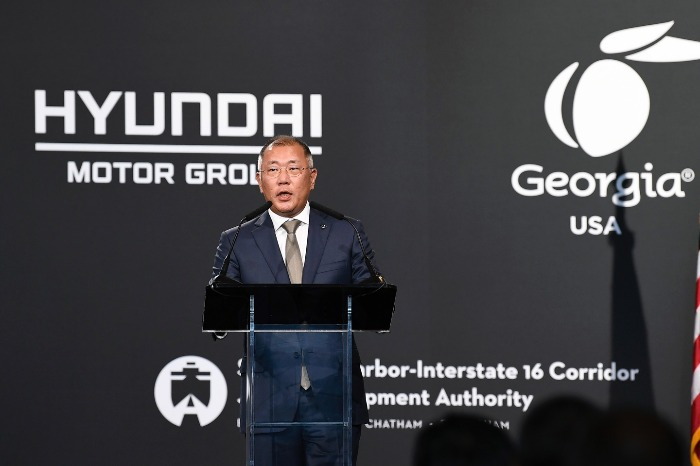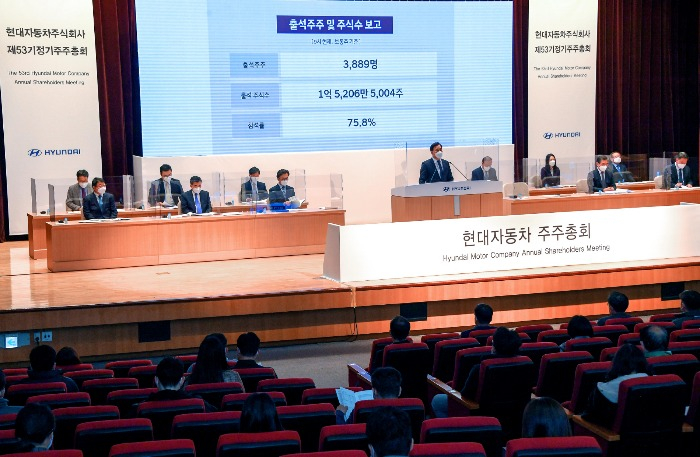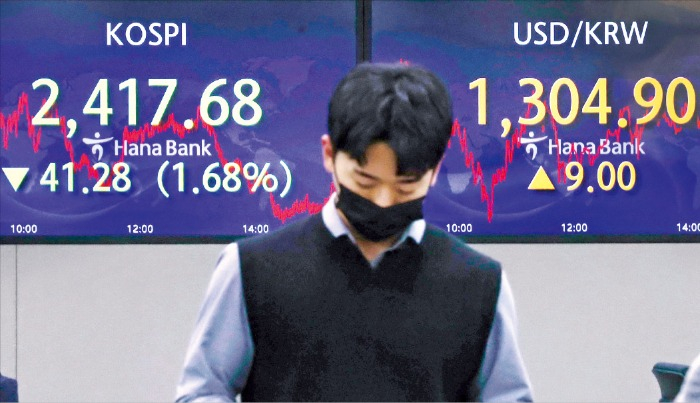Shareholder value
Hyundai takes lead in Korea’s dividend policy reform
S.Korea’s top financial regulator and the Ministry of Justice plan to revise the relevant laws
By Feb 22, 2023 (Gmt+09:00)
3
Min read
Most Read
LG Chem to sell water filter business to Glenwood PE for $692 million


Kyobo Life poised to buy Japan’s SBI Group-owned savings bank


KT&G eyes overseas M&A after rejecting activist fund's offer


StockX in merger talks with Naver’s online reseller Kream


Mirae Asset to be named Korea Post’s core real estate fund operator



The Hyundai Motor Group is set to become South Korea’s first conglomerate to disclose dividend allocations ahead of the ex-dividend date, a move that the country’s top financial regulator said would resolve the so-called “Korea Discount” and attract long-term foreign investors.
Hyundai Motor Co. on Wednesday unveiled a draft of its revised articles of association to revamp its dividend policy. Its key affiliates such as Hyundai Mobis Co., and Kia Corp. plan to follow suit.
“We decided to revise our dividend payment procedures in line with the global standard and to meet investor demand to enhance shareholder value,” said a Hyundai Motor executive.
“Under the new dividend policy, investors will be able to make an investment decision based on our dividend allocations.”
The move is aimed at improving predictability and reducing uncertainty in the domestic stock market.
This will eventually help the South Korean stock market obtain MSCI’s developed market status, according to an official of the regulatory Financial Services Commission (FSC).
Last month, both the FSC and the Ministry of Justice issued guidance for Korean companies to revamp their dividend payout policy.
In that regard, they plan to revise the Capital Markets Act, the FSC said in a January statement.
“Hyundai Motor Group responded to our guidance for dividend policy reform more swiftly than expected,” the FSC official told The Korea Economic Daily. “It will contribute to the development of South Korea’s capital market.”
Most of South Korean companies set their ex-dividend date at year’s end and confirm their dividend allocations at general meetings in spring of the following year.
That means investors have to buy the stock with a lack of knowledge of its dividend payout ratio even as they near the end of the year.

MSCI, one of the world’s leading index providers, cited South Korea’s opaque dividend payment system as one of the reasons for not raising the country to developed market status. It has been categorized as an emerging market since 1992.
If Hyundai’s dividend policy revision won shareholder approval at the March general meeting, it will confirm its dividend allocations around February next year before its shares turn ex-dividend.
The new policy must get nods from more than one-third of its shareholders, or more than two-thirds of shareholders attending at the general meeting.
DIVIDEND STOCKS
The move is expected to boost its corporate value and lead to the payout increase over time.
“Institutional investors tended to avoid dividend stocks because of their opaque dividend system,” said a fund manager of a foreign financial services firm.
“If the relevant regulations are improved, we will be able to make investment decisions with clear knowledge of their dividend payout ratios and their valuations will appropriately reflect their dividend policies.”

Steel giant POSCO Holdings Inc. on Monday proposed a revision to its dividend payout system as well.
But it seems to take some time for other Korean companies to shift toward the new dividend policy, despite its positive effects such as growth in foreign capital inflows and market liquidity increase.
Samsung Electronics Co. has officially dismissed a possible revision to its dividend policy this year. The world’s largest memory chip and smartphone maker is among the few Korean companies to pay both quarterly and year-end dividends.
“The government needs to offer some incentives such as tax benefits to companies that adopt the new dividend system,” a Korean conglomerate official said.
Write to Dong-Hun Lee and Hyeong-Gyo Seo at leedh@hankyung.com
Yeonhee Kim edited this article
More to Read
-
 Korean stock marketKorean holding firms likely to post bigger dividend payouts in 2022
Korean stock marketKorean holding firms likely to post bigger dividend payouts in 2022Dec 20, 2022 (Gmt+09:00)
1 Min read -
 Korean stock marketKorea to revise dividend policy to ease ‘Korea discount’ concerns
Korean stock marketKorea to revise dividend policy to ease ‘Korea discount’ concernsNov 24, 2022 (Gmt+09:00)
3 Min read -

Comment 0
LOG IN


